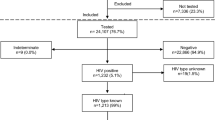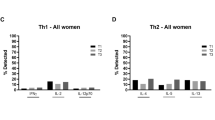Abstract
Objective
To compare rates of adverse pregnancy outcomes for HIV, tuberculosis, and malaria-infected patients in the United States with those of uninfected patients.
Study design
A nationally representative sample of 24,149,664 singleton live births were identified using pregnancy hospitalizations that resulted in delivery between 1998–2000 and 2009–2011 in this retrospective cohort study. Maternal and fetal outcomes were evaluated.
Results
There were 7204 HIV cases, 1450 TB cases, and 296 malaria cases over the two time periods, and the average age of infected subjects was 28.3. The HIV group was more likely to have almost all adverse pregnancy outcomes than the control group in both time periods. The 2009–2011 HIV group was more likely to undergo cesarean delivery than the 1998–2000 HIV group [1959 versus 1649, p < 0.0001].
Conclusion
Out of pregnant women infected with HIV, malaria, or tuberculosis, those infected with HIV are more likely to experience several adverse pregnancy outcomes than uninfected women.
This is a preview of subscription content, access via your institution
Access options
Subscribe to this journal
Receive 12 print issues and online access
$259.00 per year
only $21.58 per issue
Buy this article
- Purchase on Springer Link
- Instant access to full article PDF
Prices may be subject to local taxes which are calculated during checkout

Similar content being viewed by others
References
Kourtis AP, Ellington S, Pazol K, Flowers L, Haddad L, Jamieson J. Complication of cesarean deliveries among HIV-infected women in the United States. AIDS. 2014;28:2609–18.
Kourtis AP, Bansil P, McPheeters M, Meikle SF, Posner SF, Jamieson DJ. Hospitalizations of pregnant HIV-infected women in the USA prior to and during the era of HAART, 1994–2003. AIDS. 2006;20:1823–31.
Arab K, Spence AR, Czuzoj-Shulman N, Abenhaim HA. Pregnancy outcomes in HIV-positive women: a retrospective cohort study. Arch Gynecol Obstet. 2017;295:599–606.
El-Messidi A, Czuzoj-Shulman N, Spence AR, Abenhaim HA. Medical and obstetric outcomes among pregnant women with tuberculosis: a population-based study of 7.8 million births. Am J Obstet Gynecol. 2016;215:e1–6.
World Health Organization. World Malaria Report 2015. 2015. https://www.who.int/malaria/publications/world-malaria-report-2015/wmr2015-without-profiles.pdf?ua=1.
Callaghan WM, Creanga AA, Kuklina EV. Severe maternal morbidity among delivery and postpartum hospitalizations in the United States. Obstet Gynecol. 2012;120:1029–36.
Ewing AC, Datwani HM, Flowers LM, Ellington SR, Jamieson DJ, Kourtis AP. Trends in hospitalizations of pregnant HIV-infected women in the United States: 2004 through 2011. Am J Obstet Gynecol. 2016;215:499.e1–8.
Dominguez KL, Lindegren ML, D’Almada PJ, Peters VB, Frederick T, Rakusan TA, et al. Increasing trend of cesarean deliveries in HIV-infected women in the United States from 1994 to 2000. J Acquir Immune Defic Syndr. 2003;33:232–8.
Read JS, Newell M-L. Efficacy and safety of cesarean delivery for prevention of mother-to-child transmission of HIV-1. Cochrane Database Syst Rev. 2005;CD005479.
International Perinatal HIV Group, Andiman W, Bryson Y, de Martino M, et al. The mode of delivery and the risk of vertical transmission of human immunodeficiency virus type 1 — a meta-analysis of 15 prospective cohort studies. N Engl J Med. 1999;340:977–87.
Panburana P, Sirinavin S, Phuapradit W, Vibhagool A, Chantratita W. Elective cesarean delivery plus short-course lamivudine and zidovudine for the prevention of mother-to-child transmission of human immunodeficiency virus type 1. Am J Obstet Gynecol. 2004;190:803–8.
Forsyth BWC, Davis JA, Freudigman KA, Katz KH, Zelterman D. Pregnancy and birth rates among HIV-infected women in the United States: the confounding effects of illicit drug use. AIDS. 2002;16:471–9.
Centers for Disease Control and Prevention. Enhanced perinatal surveillance - 15 areas, 2005-2008. HIV Surveill Suppl Rep 2011. 2011;16:5–32.
Desale M, Thinkhamrop J, Lumbiganon P, Qazi S, Anderson J. Ending preventable maternal and newborn deaths due to infection. Best Pr Res Clin Obstet Gynaecol. 2016;36:116–30.
Schmit KM, Wansaula Z, Pratt R, Price SF, Langer AJ. Tuberculosis - United States, 2016. Weekly. 2017;66:289–94.
Centers for Disease Control and Prevention. Diagnoses of HIV infections in the United States and dependent areas, 2015. HIV Surveill Rep. 2016;27:1–114.
Centers for Disease Control and Prevention. HIV in the United States and dependent areas. https://www.cdc.gov/hiv/statistics/overview/ataglance.html. 2019.
Salazar-Austin N, Hoffmann J, Cohn S, Mashabela F, Waja Z, Lala S, et al. Poor obstetric and infant outcomes in HIV-infected pregnant women with tuberculosis in South Africa: The Tshepiso Study. Clin Infect Dis. 2018;66:921–9.
Author information
Authors and Affiliations
Corresponding author
Ethics declarations
Conflict of interest
The authors declare that they have no conflict of interest.
Additional information
Publisher’s note Springer Nature remains neutral with regard to jurisdictional claims in published maps and institutional affiliations.
Rights and permissions
About this article
Cite this article
Ahmadzia, H.K., Khorrami, N., Carter, J.A. et al. Impact of human immunodeficiency virus, malaria, and tuberculosis on adverse pregnancy outcomes in the United States. J Perinatol 40, 240–247 (2020). https://doi.org/10.1038/s41372-019-0512-9
Received:
Revised:
Accepted:
Published:
Issue Date:
DOI: https://doi.org/10.1038/s41372-019-0512-9



